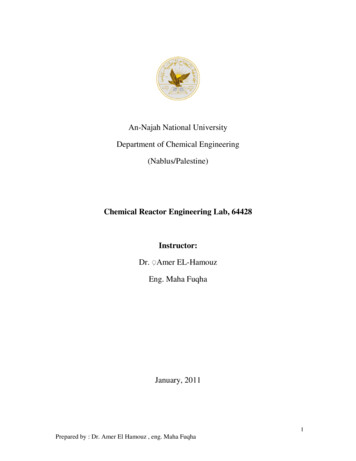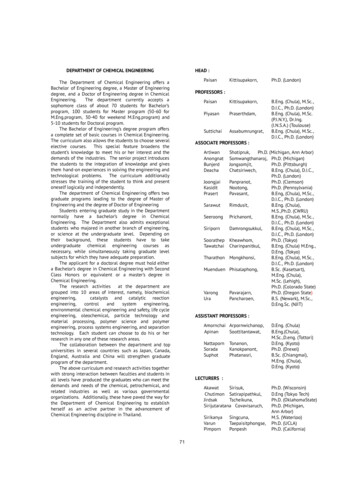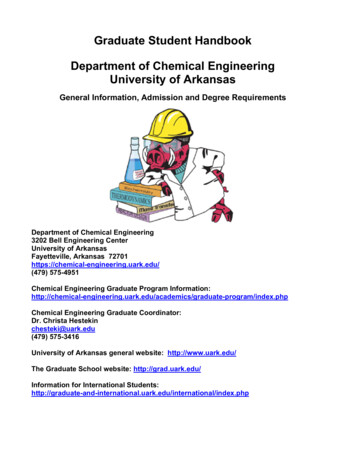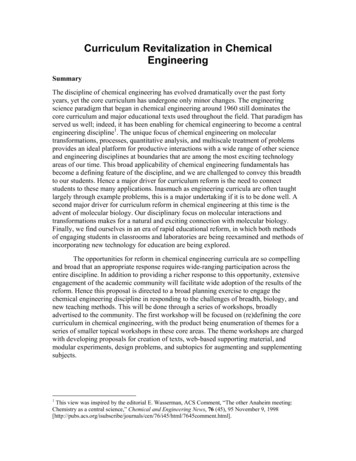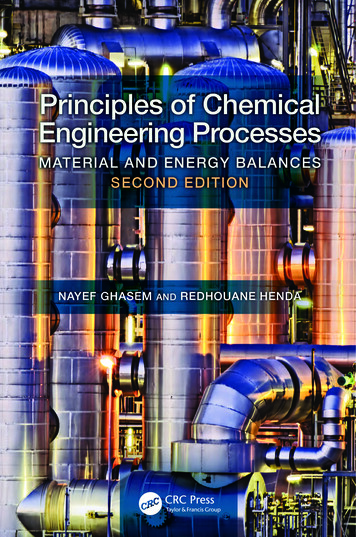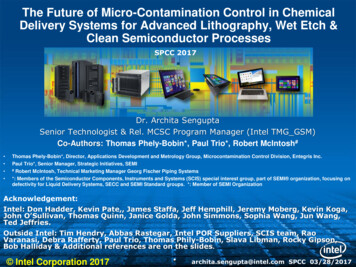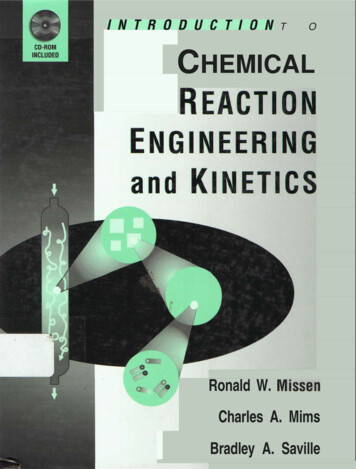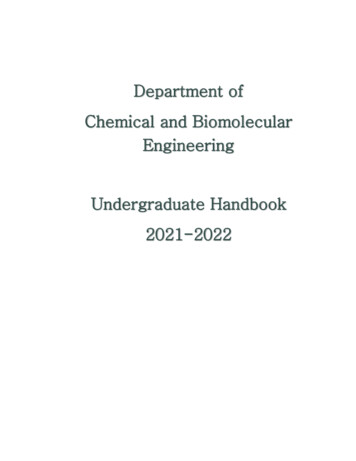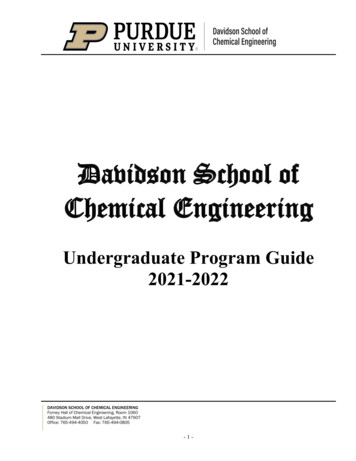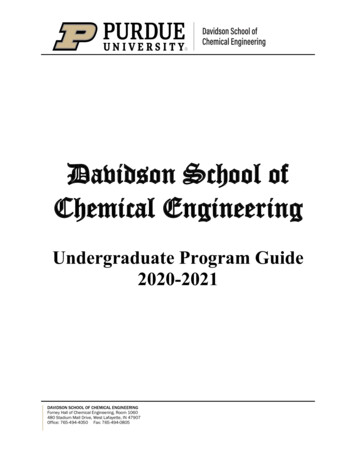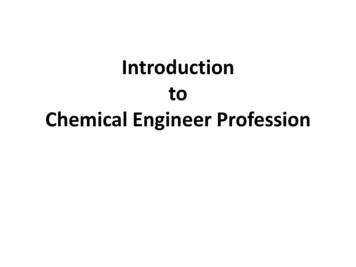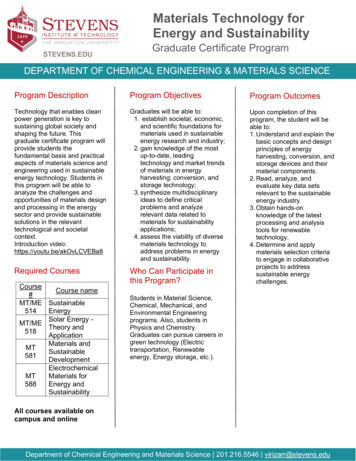
Transcription
Materials Technology forEnergy and SustainabilitySTEVENS.EDUGraduate Certificate ProgramDEPARTMENT OF CHEMICAL ENGINEERING & MATERIALS SCIENCEProgram DescriptionProgram ObjectivesProgram OutcomesTechnology that enables cleanpower generation is key tosustaining global society andshaping the future. Thisgraduate certificate program willprovide students thefundamental basis and practicalaspects of materials science andengineering used in sustainableenergy technology. Students inthis program will be able toanalyze the challenges andopportunities of materials designand processing in the energysector and provide sustainablesolutions in the relevanttechnological and societalcontext.Introduction video:https://youtu.be/akOvLCVEBa8Graduates will be able to:1. establish societal, economic,and scientific foundations formaterials used in sustainableenergy research and industry;2. gain knowledge of the mostup-to-date, leadingtechnology and market trendsof materials in energyharvesting; conversion, andstorage technology;3. synthesize multidisciplinaryideas to define criticalproblems and analyzerelevant data related tomaterials for sustainabilityapplications;4. assess the viability of diversematerials technology toaddress problems in energyand sustainability.Required CoursesWho Can Participate inthis Program?Upon completion of thisprogram, the student will beable to:1. Understand and explain thebasic concepts and designprinciples of energyharvesting, conversion, andstorage devices and theirmaterial components.2. Read, analyze, andevaluate key data setsrelevant to the sustainableenergy industry.3. Obtain hands-onknowledge of the latestprocessing and analysistools for renewabletechnology.4. Determine and applymaterials selection criteriato engage in collaborativeprojects to addresssustainable energychallenges.CourseCourse name#MT/ME Sustainable514EnergySolar Energy MT/METheory and518ApplicationMaterials erials for588Energy andSustainabilityStudents in Material Science,Chemical, Mechanical, andEnvironmental Engineeringprograms. Also, students inPhysics and Chemistry.Graduates can pursue careers ingreen technology (Electrictransportation, Renewableenergy, Energy storage, etc.).All courses available oncampus and onlineDepartment of Chemical Engineering and Materials Science 201.216.5546 virizarr@stevens.edu
Materials Technology forEnergy and SustainabilitySTEVENS.EDUGraduate Certificate ProgramDEPARTMENT OF CHEMICAL ENGINEERING & MATERIALS SCIENCEInstructorsProf. Hamid Hadim, Mechanical Engineering, ahadim@stevens.eduDr. Hamid Hadim is a Professor of Mechanical Engineering. He has research interests inSustainable Energy Systems; and Multidisciplinary Design and Optimization in Electronicsand MEMS Packaging. He is also active in educational research related to pedagogicalapproaches for engineering education. Dr. Hadim is the recipient of Alexander HumphreysDistinguished Teaching Award and the Jess H. Davis Memorial Research Award, fromStevens.Prof. Charles Cohn, Chem. Eng. & Mater. Sci., ccohn@stevens.eduCharles Cohn is an Adjunct Professor at Stevens who has extensive experience in therenewable energy field. He designed numerous passive and active solar heated systems forcommercial and residential buildings in NJ. He authored a book and numerous articles andwas awarded 11 US patents. Prof. Cohn holds BS, MS & ME degrees in mechanicalengineering from Columbia University and has a New Jersey Professional EngineeringLicense.Prof. Keith Sheppard, Chem. Eng. & Mater. Sci., ksheppar@stevens.eduDr. Keith G. Sheppard is a Professor of Materials Science. His education in the U.K.included B.Sc. (University of Leeds) and Ph.D. (University of Birmingham) degrees inMetallurgy and a diploma in Industrial Administration (Aston University). His researchinterests have included electrochemical aspects of materials synthesis and environmentaldegradation of materials. Prof. Sheppard has had a leading role in curriculum developmentat Stevens, including creating two sustainability programs.Prof. Jae Chul Kim, Chem. Eng. & Mater. Sci., jkim7@stevens.eduDr. Jae Chul Kim is an Assistant Professor of Chemical Engineering & MaterialsScience. Prof. Kim has expertise in electrochemistry, battery engineering and materialsdesign. His current research focuses on developing next-generation battery materials for EVand grid storage applications. He obtained his PhD at MIT and finished postdoc training atLawrence Berkeley National Laboratory.Prof. Dino Favetta, Chem. Eng. & Mater. Sci., dfavetta@stevens.eduDino Favetta is an industry expert on the conversion of biomass to valorized products. Healso has extensive applications experience in Electric Distribution Grid Automation using A.I.Prof. Favetta is CEO of Michrinik Technologies, LLC, a firm that specializes in thedevelopment of Renewable Energy and "Green" Electric Storage. Additionally, he is thepresident of CapChar, Inc., manufacturer of High Energy Density Ultracapacitors using safe,renewable materials. He holds a B.E in Chemical Engineering and an M.E. in ElectricalEngineering, both from Stevens.Program Contact Information: Professor Jae Chul KimOffice: Burchard 010BPhone: 201.216.5286; Email: jkim7@stevens.eduDepartment of Chemical Engineering and Materials Science 201.216.5546 virizarr@stevens.edu
ME/MT514Sustainable EnergySTEVENS.EDUDEPARTMENT OF CHEMICAL ENGINEERING & MATERIALS SCIENCECourse DescriptionThe course provides basicconcepts and working knowledgeof current and potential futureenergy systems, fuel resources,conversion of resources, andend-use, and emphasis onmeeting local and global energyneeds in the 21st century in asustainable manner. Specialattention will be given to thecurrent global energy situationwhich places great focus on fossilfuels. Various renewable andconventional energy technologieswill be presented includingnuclear, wind, solar, andhydrogen, and their attributesdescribed within a framework thataids in evaluation and analysis ofenergy technology systems in thecontext of political, social,economic, and environmentalgoals. Systems engineering andeconomic tools will be presentedwhich are critical for theevaluation of competing energyapproaches.Course Objectives1. Introduce basics concepts andperformance of various energyconversion systems includingtraditional (combustion andnuclear) and alternative (solar,wind, hydrogen, etc);2. Present environmental issuesrelated to the greenhouse effectand global climate change;3. Perform comparative analysis ofvarious energy conversionsystems. The main criteria usedfor comparison includeeconomic, social acceptabilityand environmentalconsequences.Who Can Take thisCourse?Students in Chemical, Mechanical,Industrial, Material Science, Civiland Environmental Engineeringprograms. Also, students inPhysics, and Chemistry who areinterested in energy andsustainability.Course OutcomesBy the end of this course thestudent will be able to:1. Demonstrate a basicunderstanding of existingenergy technologies includingfossil (oil, gas, synthetic),nuclear (fission and fusion)and renewable (solar,biomass, wind, hydro, andgeothermal) energy systems.2. Demonstrate a basicunderstanding of energystorage, transmission, andconservation methods3. Analyze and evaluate energytechnology systems to meetregional and global energyneeds4. Design energy systems tomeet specified needs basedon alternative technologies5. Analyze and evaluate energysystems designs in the contextof political, social, economic,and environmental goals6. Work on a team to complete aterm project involving theassessment, analysis, anddesign of an energy productionsystem based on alternativetechnologies.New! Graduate Certificate Program – Materials Technology for Energy and Sustainability
ME/MT514Sustainable EnergySTEVENS.EDUDEPARTMENT OF CHEMICAL ENGINEERING & MATERIALS SCIENCEInstructorDr. Hamid Hadim is currently Professor and Associate Chair for UndergraduateEducation in the Mechanical Engineering Department. Dr. Hadim has technicalresearch interests in Sustainable Energy Systems; Thermal Challenges inMicro/nano Systems; Thermal Convection and Fluid Dynamics in Porous Media;Innovative Microelectronics Cooling Techniques; and Multidisciplinary Designand Optimization in Electronics and MEMS Packaging. He is also active ineducational research related to pedagogical approaches for engineeringeducation. Dr. Hadim is the recipient of the Alexander Humphreys DistinguishedTeaching Award and the Jess H. Davis Memorial Research Award, from StevensInstitute of Technology. Dr. Hadim is a fellow of the American Society ofMechanical Engineers ction to energy systemsSystems tools for energy systemsEconomic tools for energy systemsClimate change modelsFossil fuel resourcesCombustionCarbon sequestrationNuclear energySolar energyWind energyBioenergyTransportation energyCreating 21st century energy systemsPre-requisite:E234 or Equivalent.Cross-listing:ME514Program:Materials Science andEngineeringAvailable on campusand onlineCredit Appliedtowards GraduateDegree or CertificateContactInformationProfessor Hamid HadimOffice: C204 CarnegieMain CampusPhone: 201.216.5569Email:ahadim@stevens.eduDepartment of Chemical Engineering and Materials Science 201.216.5546 virizarr@stevens.edu
MT518/ME518Solar Energy, Theory & ApplicationSTEVENS.EDUDEPARTMENT OF CHEMICAL ENGINEERING & MATERIALS SCIENCECourse DescriptionCourse ObjectivesCourse OutcomesThe course is intended forstudents who have interest inalternate energy sources as acontributor to sustainability. Itprovides a comprehensivetreatise on the science andtechnology of solar energy, itscollection and the designprinciples that need to beunderstood for its effective usein a variety of installations anduses.The overall goal of this course is tomake the student aware of themany solar energy technologysources available to apply tosustainability projects.At the end of the course thestudents should be able to:Understand the factors thatinfluence the use of solarradiation as an energy source;know the various active andpassive technologies that areavailable for collecting solarenergy; have the ability to applydesign principles to selection ofan appropriate solar energyinstallation to meetrequirements.Students will find this anexciting course topic, which isat the forefront of interest in therenewable energy field. Thecourse provides an insight inthe many ways that one cancollect solar energy for the usein alternate energyapplications.Who Can Take this Course?Students that have an interest inrenewable energy and sustainability.It would also be helpful if the studenthad an understanding of physics,chemistry, mathematics,thermodynamics and heat transfer.New! Graduate Certificate Program – Materials Technology for Energy and Sustainability
MT518/ME518Solar Energy, Theory & ApplicationSTEVENS.EDUDEPARTMENT OF CHEMICAL ENGINEERING & MATERIALS SCIENCEInstructorCharles Cohn is an adjunct professor at Stevens who has taught, for thepast ten years, two solar energy courses titled “Solar Energy, Theory andApplication” and “Solar Energy, System Designs” and a wind energy coursetitled “Wind Energy, Theory and Application” for seniors and graduatestudents. Professor Cohn has extensive experience in the renewable energyfield. He has collaborated with architects in New Jersey designing numerouspassive and active solar heated systems for commercial and commercial andresidential buildings in New Jersey. In his prior career, at AT&T/Bell Labs,Lucent Technologies and Agere Systems, he was involved in the semiconductor field, developing advanced organic IC packages and providingtechnical and marketing analyses. He authored a book and numerousarticles and was awarded 11 US patents in this field. Mr. Cohn holds BS, MS& ME degrees in mechanical engineering from Columbia University and hasa New Jersey Professional Engineering ion to solar energyReview of basic heat transfer principlesFundamentals of solar radiationSolar design criteriaCollectors of solar radiationTransfer and storage of heatPassive solar heating systemsActive solar heating systemsSolar cooling of buildingsPhotovoltaics (PV)Solar energy economicsA sampling of solar heated buildings in the United States and theircharacteristicsCross-listing:ME518Available on campus andonlineCredit Applied towardsGraduate Degree orCertificateContactInformationProfessor Charles CohnPhone: 973.696.4611Email: ccohn@stevens.eduDepartment of Chemical Engineering and Materials Science 201.216.5546 virizarr@stevens.edu
MT581WSMaterials & Sustainable DevelopmentDEPARTMENT OF CHEMICAL ENGINEERING & MATERIALS SCIENCECourse DescriptionCourse ObjectivesCourse OutcomesThe course provides a systemsoriented approach and frameworkfor analyzing sustainabledevelopment and the critical roleof materials in it. In addition to thetechnical issues such as inmaterial’s and process selection,it recognizes the complexity ofsustainability and associatedsocial, environmental, economicand legal factors.Students will be able to:1. Understand the sustainabilityrelated life cycle associatedwith the selection, processing,use and disposal of materialsused in products or structures.2. Understand howenvironmental, economic, legaland social factors influencesustainable development.3. Be able to propose rationaltechnical decisions tosustainable developmentchallenges related to thematerials life cycle in thecomplex non-technicalenvironment in which thesemust be made.Students will be able to:1. Know & understand the basicparameters of sustainabledevelopment, especially relatedto the materials life cycle2. Understand the complexity thatsurrounds assessment ofsustainable development3. Conduct a systematicassessment of a materialsrelated sustainabledevelopment project4. Synthesize multi-disciplinaryinformation associated with asingle problem5. Identify stakeholders and theirperspectives on a specific issue6. Find information from diversesources and form a judgementabout its reliability7. Present the results of aninvestigation clearly andsuccinctly8. Evaluate options forsustainable developmenttechnologies involving materialsWho Can Take thisCourse?Suitable for any engineeringdiscipline. Also, students inPhysics, and Chemistry who areinterested in energy andsustainability.New! Graduate Certificate Program – Materials Technology for Energy and Sustainability
MT581WSMaterials & Sustainable DevelopmentSTEVENS.EDUDEPARTMENT OF CHEMICAL ENGINEERING & MATERIALS SCIENCEInstructorDr. Keith G. Sheppard is a professor of Materials Science. His education inthe U.K. included B.Sc. (University of Leeds) and Ph.D. (University ofBirmingham) degrees in Metallurgy and a diploma in Industrial Administration(Aston University). His research interests have included electrochemicalaspects of materials synthesis and environmental degradation of materials. Hereceived the Henry Morton Distinguished Teaching Professor Award in 2009.Prof. Sheppard has had a leading role in curriculum development at Stevens,including creating two sustainability programs. He was co-lead faculty on threeentries to the international Solar Decathlon net-zero energy solar housecompetition, including a winner.Topics1.2.3.4.5.6.7.8.9.10.11.12.13.Course OverviewModule 1: Introduction to sustainability & population growthModule 2: Introduction to sustainable developmentModule 3: Assessing sustainable development projects & life cyclethinkingModule 4: Life cycle assessmentModule 5: Materials supply chain risk & corporate social responsibilityModule 6: The circular economy visionCase Study 1Case Study 2Case Study 3Sustainable development projectModule 7: Life cycle costing & social life cycle assessmentSustainable development projectPre-requisite:E 344 or MT 501 orequivalentProgram:Materials Science andEngineeringAvailable onlineCourse Web ourse Schedule:Monday to SundayVirtual Office Hours:Tues & Thurs 1-2pmVirtual session URL:https://stevens.zoom.us/j/8025439958Credit Applied towardsGraduate Degree orCertificateContactInformationProfessor KeithSheppardOffice: 408 BurchardMain CampusPhone: 201.216.5260Email:ksheppar@stevens.eduDepartment of Chemical Engineering and Materials Science 201.216.5546 virizarr@stevens.edu
MT/CHE588STEVENS.EDUElectrochemical Materials andDevices for Energy and SustainabilityDEPARTMENT OF CHEMICAL ENGINEERING & MATERIALS SCIENCECourse DescriptionThe course provides basicconcepts and working principlesof electrochemical energy storageand conversion devices with afocus on materials. This coursealso discusses the materialseconomy and the environmentalimpact of using suchelectrochemical devices. Thiscourse will engage students in adesign project and case studieson contemporary electrochemicalmaterials and devices.Course Objectives1. The student will develop afundamental understanding ofelectrochemistry and materialsscience for batteries,capacitors, and fuel cells.2. The student will gain and applyknowledge of the most up-todate, leading research andtechnology trends of suchapplications.3. The student will understand theenvironmental, economic, andsocial impacts of energystorage and conversiondevices.Who Can Take thisCourse?Students in Chemical, Mechanical,Industrial, Material Science, Civiland Environmental Engineeringprograms. Also, students inPhysics, and Chemistry who areinterested in energy andsustainability.Course OutcomesBy the end of this course thestudent will:1. establish the materials selectioncriteria and performancedetermining factors forelectrochemical energy storageand conversion devices;2. conduct a systematicassessment of an energybalance for using energystorage and conversion devicesin perspectives of materials andsustainability;3. analyze opportunities andchallenges of energy storageand conversion devices;4. evaluate the materials marketand options for batteries,supercapacitors, and fuel cells;5. synthesize multi-disciplinaryinformation associated with asingle problem;6. present the results of aninvestigation clearly andsuccinctly;7. work effectively on a team tocomplete a project.New! Graduate Certificate Program – Materials Technology for Energy and Sustainability
MT/CHE588STEVENS.EDUElectrochemical Materials andDevices for Energy and SustainabilityDEPARTMENT OF CHEMICAL ENGINEERING & MATERIALS SCIENCEInstructorsDr. Jae Chul Kim is an Assistant Professor of Chemical Engineering andMaterials Science at Stevens Institute of Technology. Prof. Kim is a batteryscientist who has expertise in electrochemical engineering and materials design.His current research focuses on developing next-generation batteries for EV andgrid storage applications. He obtained his PhD in Materials Science andEngineering from MIT with postdoc training at Lawrence Berkeley NationalLaboratory.Dino Favetta is an industry expert on the conversion of biomass to valorizedproducts. He also has extensive applications experience in Electric DistributionGrid Automation using A.I. Prof. Favetta is CEO of Michrinik Technologies, LLC,a firm that specializes in the development of Renewable Energy and "Green"Electric Storage. Additionally, he is the president of CapChar, Inc., manufacturerof High Energy Density Ultracapacitors using safe, renewable materials. Heholds a B.E in Chemical Engineering and an M.E. in Electrical Engineering, bothfrom d and renewable energy technologies - market driversMaterials economics and sustainability assessment - capital/operationalexpenditures; materials life-cycles; byproducts of manufacture / hazardsIntroduction to electrochemical engineering for energy conversion andstorage - 1Introduction to electrochemical engineering for energy conversion andstorage - 2Rechargeable battery technologies and materials - 1Rechargeable battery technologies and materials - 2Project: Battery designs for electric vehicles - 1Project: Battery designs for electric vehicles - 2Capacitor technologies and materials - 1Capacitor technologies and materials - 2Case studies: Markets for capacitorsFuel cell technologies and materials - 1Fuel cell technologies and materials - 2Case studies: Energy conversion technologies for grid – comparisonbetween different technologiesPre-requisite:E344 or am:Materials Science andEngineeringAvailable on campusand onlineCredit Applied towardsGraduate Degree orCertificateContactInformationProfessor Jae Chul KimOffice: 010B BurchardMain CampusPhone: 201.216.5286Email:jkim7@stevens.eduDepartment of Chemical Engineering and Materials Science 201.216.5546 virizarr@stevens.edu
processing and analysis tools for renewable technology. 4. Determine and apply materials selection criteria projects to address sustainable energy challenges. Materials Technology for Energy and Sustainability DEPARTMENT OF CHEMICAL ENGINEERING & MATERIALS SCIENCE Required Courses Course # Course name MT/ME 514 Sustainable Energy MT/ME 518
